The Rice Derivative Market is estimated at USD 20.2 billion in 2025 and is projected to reach USD 35.5 billion by 2035, registering a CAGR of 5.8%. Analyzing regional growth imbalances, Asia-Pacific emerges as the dominant market, driven by high production and consumption of rice, well-established rice processing industries, and increasing application of rice derivatives in food, beverages, and nutraceuticals. The region benefits from both raw material availability and expanding industrial infrastructure, enabling steady growth throughout the forecast period. By 2035, Asia-Pacific is expected to account for the majority of market value, reflecting continuous investment in production technology and derivative innovations. Europe represents a moderate growth region, characterized by stringent regulatory frameworks and high demand for value-added rice products in health-conscious and specialty food segments. Growth is steady but comparatively slower than Asia-Pacific due to limited rice production and higher reliance on imports, which influences market pricing and adoption rates.
By 2035, Europe’s contribution is projected to remain significant but below Asia-Pacific levels. North America demonstrates gradual expansion, with demand largely driven by processed food applications, dietary trends, and niche industrial uses. The market faces constraints from raw material dependence on imports and competitive alternatives, which temper growth relative to Asia-Pacific. The regional imbalance underscores Asia-Pacific’s leadership, Europe’s regulated growth, and North America’s incremental adoption, shaping a diverse global market trajectory from USD 20.2 billion in 2025 to USD 35.5 billion in 2035.
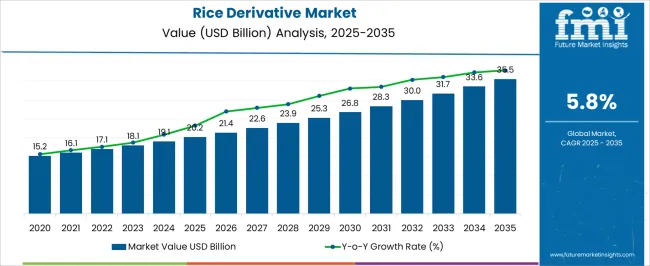
| Metric | Value |
|---|---|
| Rice Derivative Market Estimated Value in (2025 E) | USD 20.2 billion |
| Rice Derivative Market Forecast Value in (2035 F) | USD 35.5 billion |
| Forecast CAGR (2025 to 2035) | 5.8% |
The rice derivative market is expanding steadily, driven by increasing demand for natural and organic ingredients in food, cosmetics, and pharmaceutical industries. Consumer preference is shifting toward clean-label products that use plant-based and sustainably sourced ingredients.
This trend has pushed manufacturers to incorporate rice derivatives due to their functional properties and compatibility with organic formulations. Additionally, the rising focus on gluten-free and allergen-free alternatives has boosted rice starch usage as a versatile ingredient.
Advances in processing technologies have improved the quality and purity of rice derivatives, enhancing their applicability across various sectors. Growing awareness about the health benefits of organic products has further accelerated market growth. Future expansion is anticipated as demand for powdered forms of rice derivatives rises, thanks to their ease of use, storage stability, and incorporation into diverse formulations. Segmental growth is expected to be led by rice starch as the preferred ingredient, organic nature dominating the market, and powder form favored for its convenience.
By ingredient type, rice starch, rice bran, rice bran oil, rice germ, rice protein, and rice flour; by nature, organic and conventional; by form, powder and liquid; by application, processed food, bakery, beverages, infant nutrition, nutraceuticals, pharmaceutical, cosmetics, and industrial/others; by region, North America, Europe, Asia-Pacific, Latin America, and Middle East & Africa.
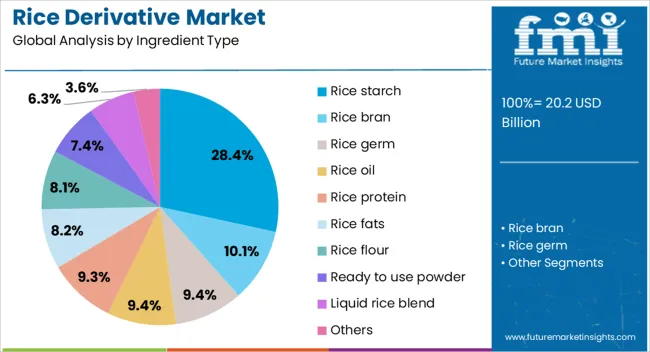
The rice starch segment is expected to account for 28.4% of the rice derivative market revenue in 2025, holding its place as the leading ingredient type. Rice starch has gained popularity due to its hypoallergenic properties and multifunctional applications in food thickening, cosmetic formulations, and pharmaceutical excipients.
Its fine texture and high purity make it ideal for clean-label products that demand minimal processing. Additionally, rice starch acts as an effective binder and stabilizer, enhancing product texture and shelf life.
Growing consumer demand for gluten-free and natural ingredients has further strengthened its market position. Manufacturers continue to innovate in rice starch extraction and modification to meet specific industry needs. The rice starch segment is expected to maintain steady growth as industries prioritize natural and safe ingredients.
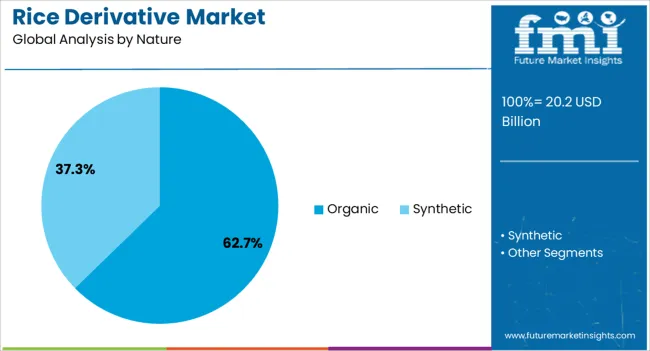
The organic segment is projected to contribute 62.7% of the rice derivative market revenue in 2025, establishing itself as the dominant nature category. The surge in organic product consumption has been driven by increasing consumer health awareness and environmental concerns.
Organic rice derivatives are perceived as safer and free from synthetic chemicals and pesticides, aligning with clean-label and sustainable product trends. Certification standards and stringent quality controls have enhanced consumer trust in organic rice derivatives.
The rise of organic food and personal care markets has created a strong pull for organic ingredients. As the organic certification process becomes more accessible and consumer preference continues to shift toward sustainability, the organic segment is expected to lead market growth.
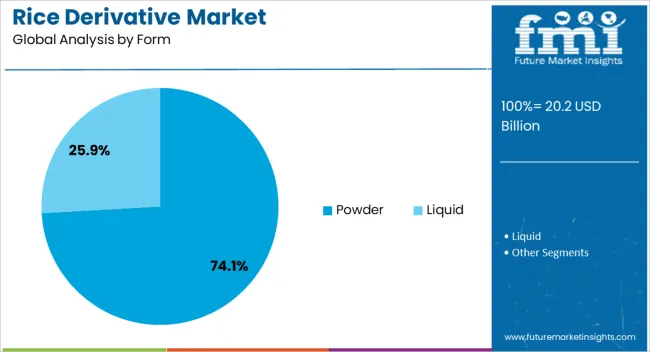
The powder form segment is projected to hold 74.1% of the rice derivative market revenue in 2025, positioning it as the most preferred form. Powdered rice derivatives offer advantages such as ease of handling, long shelf life, and versatility in blending with other ingredients.
This form is favored by manufacturers for its consistent quality and adaptability in food processing, cosmetics, and pharmaceutical applications. Powdered rice derivatives can be easily incorporated into dry mixes and liquid formulations, providing functional benefits such as thickening and moisture retention.
The growing demand for convenience and shelf-stable products has driven the popularity of the powder form. As industries continue to seek efficient ingredient formats that support clean-label formulations, the powder segment is expected to sustain its dominance in the rice derivative market.
The rice derivative market has been expanding due to increasing demand for versatile, plant-based ingredients in food, beverages, pharmaceuticals, and industrial applications. Rice derivatives, including rice flour, starch, bran, and proteins, have been widely utilized for their functional properties, hypoallergenic nature, and gluten-free characteristics. Market growth has been supported by advances in extraction, fractionation, and processing technologies. Rising health consciousness, expanding gluten-free product consumption, and increasing industrial applications have further strengthened the adoption of rice derivatives globally.
The rising awareness of gluten intolerance, celiac disease, and the preference for plant-based diets has been a key driver of the rice derivative market. Rice flour and rice proteins have been widely adopted as alternatives to wheat and other gluten-containing ingredients in bakery, confectionery, and snack products. Rice bran and rice starch have also found applications in functional foods, nutraceuticals, and beverages due to their nutritional content, including dietary fiber, antioxidants, and bioactive compounds. Food manufacturers have leveraged rice derivatives to meet the growing consumer demand for clean-label, allergen-free, and high-protein products. The increasing adoption of rice-based ingredients in vegan and vegetarian formulations has further expanded market potential, making rice derivatives a preferred solution for health-conscious consumers worldwide.
Technological innovations in extraction, milling, and fractionation have significantly improved the functionality, purity, and versatility of rice derivatives. Advanced enzymatic treatments, ultrafiltration, and nano-processing have allowed manufacturers to obtain rice proteins, starches, and oils with tailored properties for diverse applications. Improvements in drying, coating, and encapsulation techniques have enhanced solubility, stability, and sensory attributes in food and beverage formulations. Rice-based bioactive compounds and derivatives have been increasingly applied in pharmaceuticals, cosmetics, and industrial materials due to enhanced bioavailability and functional performance. These technological advancements have enabled broader applications, improved product quality, and enhanced market acceptance of rice derivatives in food, healthcare, and industrial sectors globally.
Rice derivatives have found growing applications in pharmaceutical, cosmetic, and industrial sectors, driving market expansion. Rice starch and rice proteins are utilized as excipients, binders, and stabilizers in tablets, capsules, and nutraceuticals due to their non-toxic and hypoallergenic properties. In cosmetics, rice bran oil and extracts have been applied in skincare and hair care products for antioxidant and moisturizing benefits. Industrial uses include biodegradable films, adhesives, and specialty coatings derived from rice starch and proteins. The versatility of rice derivatives across multiple end-use sectors has increased demand and investment in processing facilities, enabling continuous product innovation and meeting the requirements of diverse industrial and pharmaceutical applications globally.
The growing adoption of functional foods, plant-based diets, and allergen-free products has created significant opportunities for the rice derivative market. Emerging economies have witnessed increased consumption of rice-based ingredients due to affordability, availability, and familiarity with rice-based staples. The rising trend of fortified foods, high-protein snacks, and beverages enriched with rice proteins and bran has further expanded market potential. Investments in research and development have led to innovative rice-derived products with enhanced nutritional and functional properties. Increasing consumer preference for sustainable, plant-based, and gluten-free ingredients is expected to create long-term growth opportunities for rice derivatives across food, pharmaceutical, and industrial applications globally.
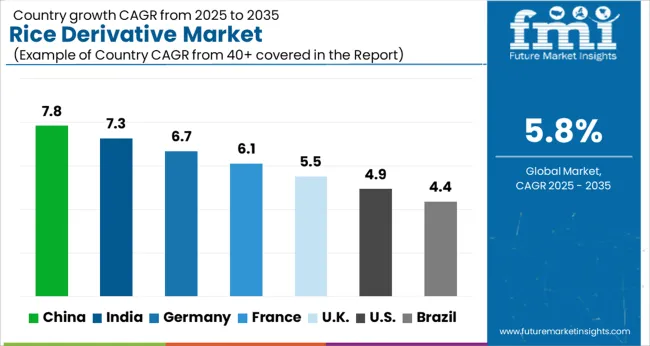
The market is anticipated to grow at a CAGR of 5.8% between 2025 and 2035, driven by rising demand for rice-based food ingredients, bio-based products, and pharmaceutical applications. China is forecast to lead with a 7.8% CAGR, supported by large-scale rice processing industries and innovation in functional ingredients. India follows at 7.3%, with growth fueled by increasing production capacities and utilization of rice by-products. Germany, at 6.7%, benefits from high adoption of rice-derived ingredients in food and personal care sectors. The UK, with a 5.5% CAGR, emphasizes product diversification and sustainable sourcing, while the USA, at 4.9%, experiences steady expansion through technological innovations in rice extraction and processing. This report includes insights on 40+ countries; the top markets are shown here for reference.
The industry in China is projected to grow at a CAGR of 7.8% between 2025 and 2035, supported by increasing demand for functional food ingredients and bio-based products. Major food and beverage manufacturers are leveraging rice derivatives for starch, protein, and oil applications, while government incentives for bioeconomy innovations are stimulating research and production. Expansion in animal feed formulations and nutraceutical applications is further boosting industry uptake. Regional hubs in Jiangsu and Guangdong are experiencing higher processing capacities and advanced milling technologies, enabling improved product quality. Collaborative ventures between domestic and international firms are enhancing raw material sourcing and downstream product diversification.
The demand for rice derivative products in India is anticipated to rise at a CAGR of 7.3% over 2025 to 2035, fueled by rising functional food consumption and expanding animal feed applications. Leading manufacturers are investing in processing plants in Punjab and Andhra Pradesh to enhance production efficiency. Research initiatives focusing on rice protein and rice bran oil extraction are increasing product versatility. Consumer awareness regarding nutritional benefits is driving growth in bakery, snack, and beverage formulations. Public-private collaborations are accelerating innovations in downstream applications, strengthening supply chains for export-oriented and domestic markets.
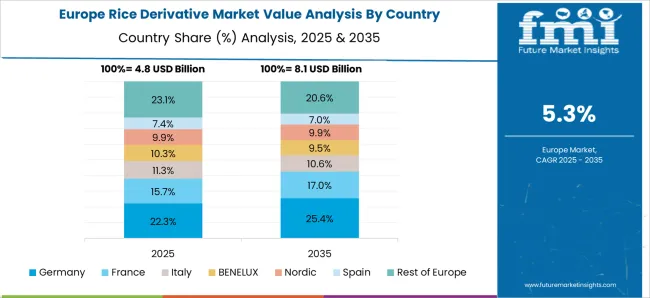
The German industry is forecast to expand at a CAGR of 6.7% from 2025 to 2035, driven by growing demand for gluten-free and plant-based ingredients. Companies are focusing on rice protein isolates, starches, and flour applications in food, beverage, and cosmetic sectors. Strategic alliances with Asian suppliers are ensuring consistent raw material availability. Innovation in clean-label products and regulatory compliance with EU standards is increasing adoption in health-conscious consumer segments. Integration of automation in processing facilities is optimizing yields and reducing operational costs, supporting the industry’s long-term competitiveness in Europe.
The UK industry is expected to grow at a CAGR of 5.5% over the forecast period, driven by plant-based food trends and functional ingredient utilization. Domestic manufacturers are investing in rice flour and protein concentrate facilities to meet rising bakery and alternative dairy product demand. Collaborations with EU-based research centers are enabling development of novel rice-derived ingredients. Increased consumption in sports nutrition and dietary supplements is creating niche opportunities. Retail and e-commerce expansion is supporting accessibility and market penetration across urban and semi-urban regions.
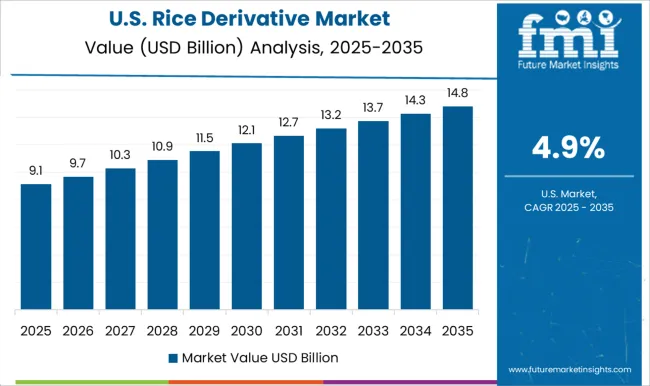
The United States rice derivative industry is forecast to expand at a CAGR of 4.9% between 2025 and 2035, driven by increasing demand for plant-based ingredients and nutraceutical applications. Leading players are focusing on rice protein isolates, bran oil, and functional starches to cater to the health food, beverage, and dietary supplement sectors. Investments in advanced processing facilities in Arkansas and California are enhancing production efficiency. Strategic partnerships with international suppliers are ensuring high-quality raw material availability for consistent output.

The market encompasses a wide range of products including rice starch, rice bran oil, rice protein, and other functional ingredients used in food, nutraceuticals, and industrial applications. Cargill stands as a dominant player with a diverse portfolio of rice derivatives, leveraging global distribution networks and research expertise to cater to food processing and health-focused segments.
Kowa India focuses on value-added rice-based ingredients for both domestic and export markets, emphasizing quality and regulatory compliance. Adani Wilmar integrates rice derivative production within its extensive edible oil and food ingredient operations, enhancing supply chain efficiency and product availability. Shafi Gluco Chem and Paras Group target specialty rice derivatives for industrial and functional food applications, with strategic investments in process optimization and product innovation.
Associated British Foods emphasizes rice protein and starch derivatives for baking, confectionery, and health applications. Emerging players like Agarwal Group of Industries, Jain Group of Industries, and Muerens Natural focus on niche formulations and organic-certified rice derivatives, catering to premium and clean-label product demands. Asharam & Sons, SACCHETTO, and RIBUS enhance their portfolios through strategic product launches and collaborations with regional food manufacturers.
Competition in this market is influenced by high processing costs, regulatory adherence for food safety, and the need for consistent quality, creating entry barriers for smaller operators while rewarding firms that combine efficiency, innovation, and compliance in their rice derivative solutions.
| Item | Value |
|---|---|
| Quantitative Units | USD Billion |
| Ingredient Type | Rice starch, Rice bran, Rice germ, Rice oil, Rice protein, Rice bran oil, Rice flour, Ready to use powder, Liquid rice blend, and Others |
| Nature | Organic and Synthetic |
| Form | Powder and Liquid |
| Application | Processed food, Bakery, Beverages, Infant food, Nutritional products, Pharmaceutical, Cosmetic, and Others |
| Regions Covered | North America, Europe, Asia-Pacific, Latin America, Middle East & Africa |
| Country Covered | United States, Canada, Germany, France, United Kingdom, China, Japan, India, Brazil, South Africa |
| Key Companies Profiled | Cargill, Kowa India Pvt. Ltd., Adani Wilmar Limited, Shafi Gluco Chem (Pvt.) Ltd., Paras Group, Associated British Foods plc (BENEO), Agarwal Industries Pvt. Ltd., Jain Group of Industries, Meurens Natural S.A., Asha Ram & Sons Pvt. Ltd., Sacchetto S.p.A., RIBUS, Inc. |
| Additional Attributes | Dollar sales by derivative type and application segment, demand dynamics across food and beverage, pharmaceuticals, and personal care industries, regional trends in production and consumption across Asia-Pacific, North America, and Europe, innovation in rice protein, rice bran oil, and rice starch extraction, environmental impact of processing waste, water usage, and sustainable sourcing, and emerging use cases in plant-based nutrition, functional foods, and cosmetic formulations. |
The global rice derivative market is estimated to be valued at USD 20.2 billion in 2025.
The market size for the rice derivative market is projected to reach USD 35.5 billion by 2035.
The rice derivative market is expected to grow at a 5.8% CAGR between 2025 and 2035.
The key product types in rice derivative market are rice starch, rice bran, rice germ, rice oil, rice protein, rice fats, rice flour, ready to use powder, liquid rice blend and others.
In terms of nature, organic segment to command 62.7% share in the rice derivative market in 2025.






Our Research Products

The "Full Research Suite" delivers actionable market intel, deep dives on markets or technologies, so clients act faster, cut risk, and unlock growth.

The Leaderboard benchmarks and ranks top vendors, classifying them as Established Leaders, Leading Challengers, or Disruptors & Challengers.

Locates where complements amplify value and substitutes erode it, forecasting net impact by horizon

We deliver granular, decision-grade intel: market sizing, 5-year forecasts, pricing, adoption, usage, revenue, and operational KPIs—plus competitor tracking, regulation, and value chains—across 60 countries broadly.

Spot the shifts before they hit your P&L. We track inflection points, adoption curves, pricing moves, and ecosystem plays to show where demand is heading, why it is changing, and what to do next across high-growth markets and disruptive tech

Real-time reads of user behavior. We track shifting priorities, perceptions of today’s and next-gen services, and provider experience, then pace how fast tech moves from trial to adoption, blending buyer, consumer, and channel inputs with social signals (#WhySwitch, #UX).

Partner with our analyst team to build a custom report designed around your business priorities. From analysing market trends to assessing competitors or crafting bespoke datasets, we tailor insights to your needs.
Supplier Intelligence
Discovery & Profiling
Capacity & Footprint
Performance & Risk
Compliance & Governance
Commercial Readiness
Who Supplies Whom
Scorecards & Shortlists
Playbooks & Docs
Category Intelligence
Definition & Scope
Demand & Use Cases
Cost Drivers
Market Structure
Supply Chain Map
Trade & Policy
Operating Norms
Deliverables
Buyer Intelligence
Account Basics
Spend & Scope
Procurement Model
Vendor Requirements
Terms & Policies
Entry Strategy
Pain Points & Triggers
Outputs
Pricing Analysis
Benchmarks
Trends
Should-Cost
Indexation
Landed Cost
Commercial Terms
Deliverables
Brand Analysis
Positioning & Value Prop
Share & Presence
Customer Evidence
Go-to-Market
Digital & Reputation
Compliance & Trust
KPIs & Gaps
Outputs
Full Research Suite comprises of:
Market outlook & trends analysis
Interviews & case studies
Strategic recommendations
Vendor profiles & capabilities analysis
5-year forecasts
8 regions and 60+ country-level data splits
Market segment data splits
12 months of continuous data updates
DELIVERED AS:
PDF EXCEL ONLINE
Rice Bran Derivatives Market Size and Share Forecast Outlook 2025 to 2035
Rice Bran Fatty Alcohols Market Size and Share Forecast Outlook 2025 to 2035
Rice Water Skincare Market Forecast and Outlook 2025 to 2035
Rice Water Haircare Market Size and Share Forecast Outlook 2025 to 2035
Rice Shampoo Bar Market Size and Share Forecast Outlook 2025 to 2035
Rice Bran Oil for Skin Care Market Size and Share Forecast Outlook 2025 to 2035
Rice Bran Oil Infusions Market Analysis - Size and Share Forecast Outlook 2025 to 2035
Rice Milling Machine Market Size and Share Forecast Outlook 2025 to 2035
Rice Mill Machine Market Size and Share Forecast Outlook 2025 to 2035
Rice Polishing Machines Market Size and Share Forecast Outlook 2025 to 2035
Rice Water Shampoo Market Size and Share Forecast Outlook 2025 to 2035
Rice Bran Oil Market Analysis by Type, End User, and Region Through 2035
Rice Processing Machine Market Size and Share Forecast Outlook 2025 to 2035
Rice Bran Wax Market Analysis - Size, Share, and Forecast 2025 to 2035
Rice Cake Market Analysis - Size, Share, and Forecast Outlook 2025 to 2035
Rice Milk Market Trends - Dairy-Free Nutrition & Industry Growth 2025 to 2035
Rice-based Products Market Analysis by Product Type, Distribution Channel, and Region Through 2035
Key Players & Market Share in Rice Water Haircare Sector
Market Share Breakdown of Rice Shampoo Bar Manufacturers
Rice Paper Stand Up Pouch Market Growth & Sustainable Packaging 2024-2034

Thank you!
You will receive an email from our Business Development Manager. Please be sure to check your SPAM/JUNK folder too.
Chat With
MaRIA